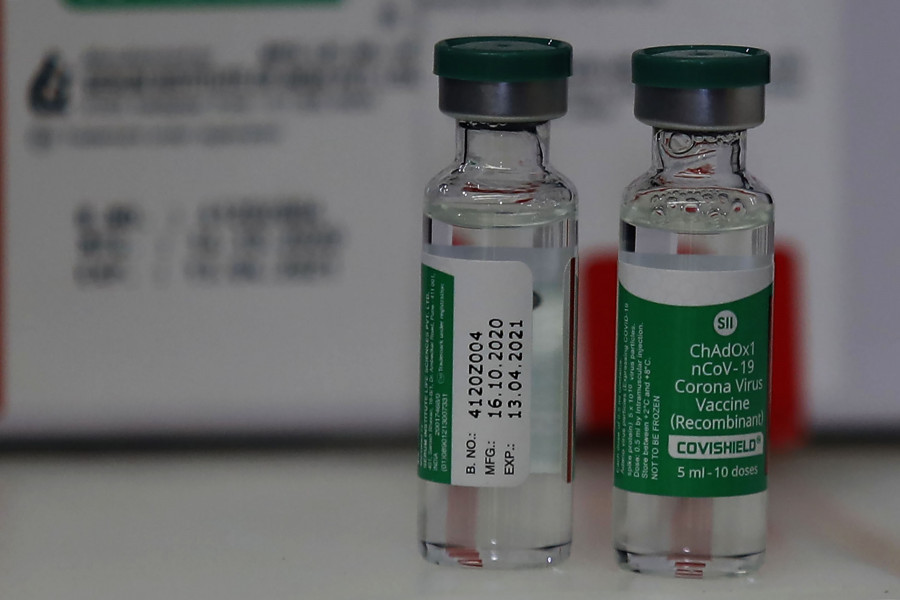National
As Nepal struggles to procure vaccines two ministers talk with their Indian counterparts
Foreign Minister Gyawali and Health Minister Tripathi are assured of resumption of supplies but when the vaccines will come is not yet clear.
Anil Giri
As Nepal scrambles to secure sufficient Covid-19 vaccines, two ministers on Friday asked their Indian counterparts to help expedite their supply.
Foreign Minister Pradeep Gyawali talked to Indian Foreign Minister S Jaishankar while Health Minister Hridayesh Tripathi had a telephone conversation with Indian Health Minister Harsh Vardhan.
“He [Gyawali] requested the External Affairs Minister of India for necessary facilitation for the supply of vaccines for Nepal to continue administering the second dose of vaccination for people at the highest risk,” the Ministry of Foreign Affairs said in a statement.
Nepal is yet to get a million doses of Covishield vaccines from the Serum Institute of India despite having paid 80 percent of the cost of approximately Rs936 million as India restricted exports following a resurgence of coronavirus cases there.
Nepal plans to administer the second dose of the vaccine to 1.35 million people over 65 in May but the government does not have sufficient stock. There are only 500,000 doses of the vaccine in store and they will be given to those immunised in the first phase in January and February.
“The External Affairs Minister of India assured him of continued support to Nepal in its fight against the pandemic, including through the supply of vaccines,” the statement said.
But it is not yet clear when the vaccines will arrive in Nepal, according to officials at the Foreign Ministry.
“Nepal remains a priority country for India for vaccine supplies but it will take some more time for the resumption of supplies to Nepal as domestic demands have surged,” a Foreign Ministry official, requesting anonymity, quoted Jaishankar as telling Gyawali over the telephone.
After India restricted the export of Covid-19 vaccines, Nepal’s immunisation drive with the University of Oxford and pharmaceutical giant AstraZeneca-developed Covishield vaccine has stopped since March 18.
In the conversation with his Indian counterpart, Health Minister Tripathi too asked that the vaccine supply be expedited.
“I told my Indian counterpart to combat the menace of the virus jointly [since] we will be secured from the pandemic only after we fully immunise the people in both countries,” Tripathi told the Post.
The sudden surge in coronavirus cases in India is a cause for concern for Nepali authorities, as the two countries share an 1,800-kilometre-long open border.
“I also requested the Indian health minister to expedite the supply of vaccines that Nepal bought with India,” said Tripathi. “Harsh Vardhanji has assured me that he will get back to me as soon as he speaks with the Serum Institute of India.”
Nepal has so far received 2.348 million doses of Covishield vaccine—1 million under a grant assistance from India; another million of the 2 million doses that the government has bought from the Serum Institute of India; and 348,000 doses under the COVAX facility.
Nepal’s plan to procure 5 million doses from the Serum Institute has also been in limbo.
Nepal resumed its vaccination campaign with the Chinese Sinopharm vaccines on Wednesday. China has provided 800,000 doses of the BBIBP-CorV vaccine in a grant.
Besides the vaccine issue, the two foreign ministers on Friday also “exchanged views on intensifying efforts to fight the Covid-19 pandemic”, according to the Foreign Ministry statement.
Gyawali also discussed developing joint protocols on the international border for Covid-19 testing and screening, according to one diplomatic source.
Antigen tests are conducted at 16 border crossings between Nepal and India.
A senior official at the Covid Crisis Management Centre said, on condition of anonymity, that health desks have already been set up at border points so as to monitor people entering Nepal from India and security agencies like Nepal Police and Armed Police Force have been asked to remain on high alert.
“We are maintaining extra vigil this time as there are concerns about new variants circulating in both India and Nepal,” the official told the Post.
But as far as the supply of vaccines is concerned, officials call Friday’s talks positive.
“We will get the response from the Indian side very soon,” an official said.




 8.22°C Kathmandu
8.22°C Kathmandu














